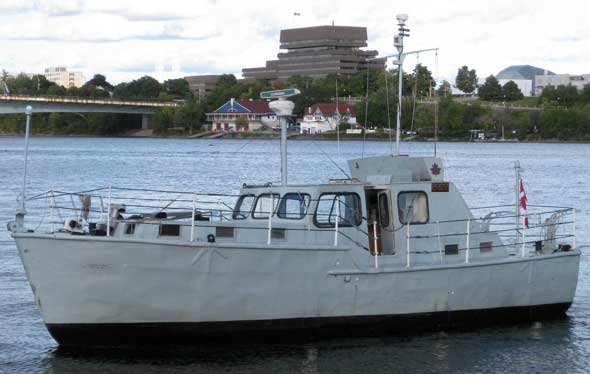|
POGO
Sounding Vessel
Built by Marine Industries Ltd., Sorel, Que, POGO, completed in 1954, was a Canadian navy hydrographic sounding vessel designed to assist HMCS Labrador on its 4 voyages (1954-58) to explore the Arctic and assert Canadian sovereignty. Displacing 15,900 lbs, POGO was 36 feet long with a draught of 3.5 feet and a top speed of .8.5 kts. She had a cruising range of 430 nautical miles. Faced with the dangers of unexpected rocks, ice flows and occasional gales, the crew of the POGO took depth soundings, reconnoitered shorelines, investigated possible harbour sites and gathered other vital information for Arctic navigation. She collected information throughout the summer Arctic season on the Prince of Wales Strait, Amundsen Gulf and the Beaufort Sea. The POGO was the First RCN vessel to enter the uncharted waters of the Canadian Arctic. Many of her survey trips were specifically launched to provide a safe route for the Labrador to follow. In 1958 the Labrador was transferred to the Department of Transportation and the POGO began a separate career. POGO was based out of Halifax and designated QMC-104 serving with the Queen's Harbour Master. She was later re-designated as YFL-104. In the 1960 she was transferred to HMCS York and became the unit's tender, and in the mind 1970s she was transferred to HMCS Carleton. POGO served as Carleton's training vessel until 1993 when, due to much needed repairs, she was taken out of service. In 1995, due to her history with HMCS Labrador, she was transferred to the Canadian War Museum. She remained in storage at the War Museum, having never been put on display, until 2005 when she was transferred to the Outaouais Branch of the Navy League of Canada. In the years that followed, students from several departments of the CEGEP de l'Outaouais, carried out repairs and tests on the POGO. In 2007 she was moved to the local marina where repairs continued from 2007 to 2009. On 13 Sep 2009, POGO, accompanied by two cadet training boats, sailed up the Ottawa River. Since that trial cruise, POGO has been providing sea cadets with the opportunity to put their classroom skills to practical use. As of 2016, POGO is still in use by the Outaouais Branch of the Navy League of Canada.
They shall not be forgotten
|


